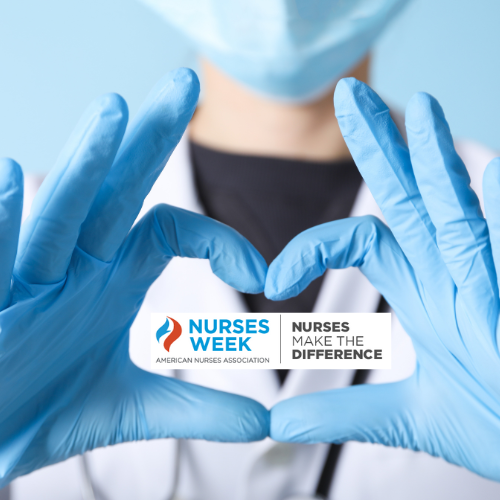The History of National Nurses Week 2024
Nurses are the heart and backbone of healthcare. Every year since March 25th, 1982, we have celebrated “National Recognition Day for Nurses” on May 6th. However, in 1990 the American Nurses Association (ANA) expanded the celebration to an entire week, declared as “National Nurses Week” to be celebrated annually from May 6th to May 12th. National Nurses Week has a different theme each year, this years theme for National Nurses Week is “Nurses Make the Difference” to honor the astonishing nurses that represent the spirit of compassion and quality care.

The History of National Nurses Week
As I mentioned earlier, National Nurses Week is celebrated annually from May 6th through May 12th. May 6th is National Nurses Day, May 8th is National School Nurse and Student Nurses Day, and May 12th is International Nurses Day. Back in 1954 National Nurses Week was actually celebrated from October 11th through October 16th. The year of this observance had marked the 100th anniversary of Florence Nightingale’s mission to Crimea. Florence Nightingale is a staple in nursing as she is the social reformer and statistician known as the founder of modern nursing. In January of 1974, the International Council of Nurses (ICN) proclaimed May 12th to be observed as “International Nurse Day” in honor of Florence Nightingale’s birthday. That same year, President Nixon issued a proclamation, and the White House designated a week to be National Nurses Week.
In 1978, New Jersey’s Governor at the time, Brendon Byrne declared May 6th to be “Nurses Day”. A resident of Red Bank, N.J., Edward Scanlan, took it upon himself to perpetuate the recognition of nurses and had the date listed in Chase’s Calendar of Annual Events. Three years later, ANA and other various organizations rallied together to support the resolution initiated by the nurses in N.M. to have May 6th established as “National Recognition Day for Nurses”. Exactly one year after this in 1982, the Board of Directors of ANA along with congress formally acknowledges and designated May 6 as “National Recognition Day for Nurses”. President Nixon officially declared May 6 as “National Recognition Day for Nurses” on March 25th, 1982.
In 1990 the ANA Board of Directors expanded the nurses recognition to a week long celebration, declaring May 6 – May 12, 1991 as National Nurses Week. In 1993, the Board of Directors for ANA established May 6 – 12 as the permanent dates to observe National Nurses Week, in 1996 they designated May 6th as “National RN Recognition Day” and May 8th as National Student Nurses Day.
The History of Florence Nightingale
As the founder of modern nursing, we owe Florence Nightingale an astounding amount of recognition as we owe her thanks for the progress she made in nursing and healthcare. Florence Nightingale was born on May 12th, 1820, in Florence, Italy. She was born into a wealthy British family. From a young age, she was active in philanthropy, ministering to old, ill, and poor people in the neighboring village. By the time she had turned 16 years old, she knew nursing was her calling. However, her parents forbid her to pursue nursing at all. It was not a respected occupation back then and women of social status were expected to marry men of social status, not pursue a career. In 1844, Florence disregarded her parents demand of marrying a wealthy man, and enrolled in nursing school at the Lutheran Hospital of Pastor Fliedner in Kaiserwerth, Germany.
After finishing nursing school, Florence returned to London where she became the superintendent at a Middlesex hospital. She faced many challenges such as a cholera outbreak with unsanitary conditions conducive to the rapid spread of the disease. It was her mission to improve hygiene practices in order to lower the death rates.
In October of 1853, the British and Russian Empire broke out in war, also known as the Crimean War. By the time 1854 rolled around, there were at least 18,000 soldiers admitted to military hospitals. Nightingale ended up receiving a letter from the Secretary of War Sidney Herbert asking her to organize a nursing team to travel to Crimea and attend to the fallen and sick soldiers. When she arrived with her team of 34 nurses, they quickly went to work. The status of the hospital was horrid as it sat on top of a cesspool that contaminated the water and building itself. With limited supplies, most soldiers were dying from infectious diseases rather than the injuries incurred in battle. Florence immediately addressed the sanitary conditions of the hospital, she gathered hundreds of scrub brushes and had everything from the floors to the ceilings scrubbed and cleaned.
Florence became known as “The Lady with the Lamp” as she worked around the clock attending to patients, even in the dark night by making her rounds with a lamp in her hand. Others simply called her “the Angel of Crimea” as the soldiers were moved by her compassion and comfort. She also created an “invalid’s kitchen” where patients with special dietary requirements had special meals. During her time there, she wrote an 830-page report analyzing her experience and proposing reforms for other militant hospitals. This book ended up sparking a complete restructuring of the War Office’s administrative department, including the establishment of a Royal Commission for the Health of the Army in 1875.
When Florence Nightingale left in the summer of 1856 after resolution of the war, she was met with a hero’s welcome. The Queen rewarded her work by representing he with a brooch known as the “Nightingale Jewel”. In addition to the brooch, Queen Victoria rewarded her with $250,000 from the British government. Florence ended up creating a Royal Commission into the health of the army.
The Impact of Florence Nightingale on Nursing
Florence’s time at the Crimean War gave her insight to all the ways they could improve the sanitary conditions and lower death rates. Since she kept adequate information and statistics in her time there, they found that 16,000 out of 18,000 deaths were from preventable diseases – not battle inflicted wounds. Due to her incredible practices and experience, her contribution to nursing still has an impact to this day. After she got awarded $250,000 from Queen Victoria, she used the money to establish the first science-based nursing school. This school also influenced the training for midwives and nurses in workhouse infirmaries.
Nightingale influenced cleanliness in hospitals, as she was the first to carry out diligent handwashing. As we know, to this day handwashing is the most basic and effective way of preventing the spread of germs and diseases. Another impact she had on nursing was paving the way of women to pursue a career in nursing. Since she was honored a hero, it created an impressive growth of women going to nursing school and getting into the career.
Florence Nightingale wrote the book, Notes on Nursing, which established nursing education. Her book was an outline of the principals of profession. In this book, Florence emphasized the importance of patient observation and the “five points of Florence Nightingale”. The five points were “pure air, pure water, efficient drainage, cleanliness, and light”.
Conclusion
As a society, we need to take the time to recognize nurses invaluable attribution to the healthcare system. Nurses play a vital role in public health, providing expert care in every community, big or small. Without nurses, our world would look very different. Take the time to recognize nurses and show appreciation for their dedication and hard work. We can celebrate nurses in a variety of ways during National Nurses Week. Different ways you can celebrate National Nursing Week is by shouting out nurses on social media, delivering flowers or food, or simply just by saying “Thank You”. A simple “Thank You” can go a long way and make someone feel seen for their hard work.

